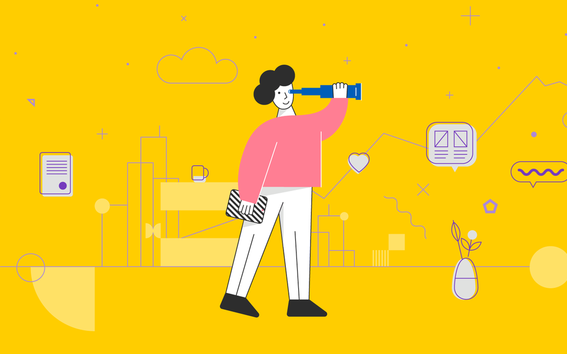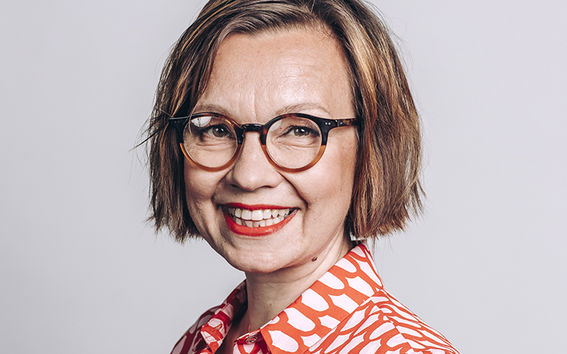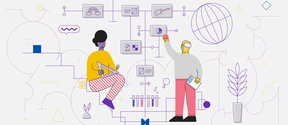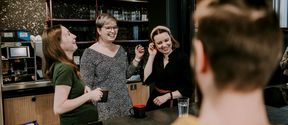Making career decisions fast and slow
Career decisions can be daunting but we can make them worse if we don’t keep our biases in check.

When I was a high school student, I made my first career decision ever based on one career exploration assignment. As I was interested in languages and all things international, I interviewed a woman who was working in an export role in the music industry in my small hometown. She had graduated from a business school so that’s where I decided to go as well. Never mind that I wasn’t interested in exports nor music industry…
Since those days, career guidance methods and career data have proliferated. Yet, career decision-making has not necessarily followed suit.
The limits of rational decision-making
Career decisions are complex, risky and transformative. The increasing uncertainty of the future and awareness of the plethora of choices are complicating career decision-making even more. Human decision-making capabilities, however, have remained the same.
As cognitive science has shown, we are not the kind of rational decision-makers as we would like to believe we are. We tend to oversimplify or overcomplicate the problem at hand. We think too fast or too slow. Career decisions are particularly prone to cognitive biases or perseveration, in other words getting stuck.
Limiting our options
When we think too fast about our careers, we rely on automatic, intuitive thinking which cognitive psychologist and behavioral economist Daniel Kahneman calls the system 1. In this mode, we use a variety of mental shortcuts that help us process information quickly and efficiently, but it may lead to bias.
Career development researchers Robert Lent & Steven Brown have examined how such biased heuristics narrow down our career alternatives prematurely or keep us stuck. For example, availability bias (“What you see is all there is”) makes us ignore possibilities that we have not been exposed to or filter some options out unconsciously due to gender, social class or other identities.
Another common bias, loss aversion, makes us overestimate the risks involved in a choice and therefore eliminate potentially good career fits or moves.
Stuck in analysis paralysis
System 1 failures can be mitigated with system 2 – rational and analytical thinking. Sometimes this kind of slow thinking can result in analysis paralysis, a common challenge in the age of information overload. While presumably rationally deliberating our decision we may be, in fact, stuck due to other type of fallacies.
For example, in the case of the sunk cost fallacy we feel unable to move on from an unsatisfactory career because we have invested so much time, money or effort in it. This problem can also surface before a career choice: we cannot commit to a job because of the erroneous belief that changing career direction would prove too costly or impossible later on.
Too much of idealism and perfectionism can also be biased thinking. In the case of the Nirvana or perfect choice fallacy, we assume there is an ideal career, calling, purpose or job out there and ignore other options.
In the worst-case scenario, we have unconsciously eliminated a number of potentially well-fitting and realistic jobs, justify our inaction with imaginary risks or sunk costs and remain stuck searching for that one perfect solution that would take us to the eternal nirvana of meaningful work.
Intelligently intuitive decisions
Given all the uncertainty, complexity and the limits of our rational decision-making, how can we possibly make any good decisions at all? Awareness of our biases helps, but relying on system 2 thinking alone will never get us there. We also need intuitive thinking to point to pursuits that matter and move us into action.
As intuition researcher Asta Raami tells us, the key is in combining the two into intelligent intuition. Harnessing this capacity will enable decisions that make sense and feel right.
PS: If you would like to learn more about harnessing your intuitive intelligence, Asta Raami will be talking about this at our Feel the Future Dialogues on November 19th. Welcome to join us!

Blog writer
Kirsi LaPointe, D.Sc., develops and facilitates new career programs for Aalto University students and alumni based on the principles of career design and life-wide learning. Her research and expertise focus on career transitions, meaningful work practices and inclusion, and she is particularly interested in practice-based, narrative approaches to studying identity, work, and careers.
Show other posts from this blog

How to make a difference through work?
Choosing the right problem to work on is the most important decision when considering your impact.
Take time to explore your career opportunities
If you are not sure about what you want to do, it’s ok to take some time to figure it out.
Radical career creativity
Cultivating creativity is key to adaptability and meaning amidst uncertainty